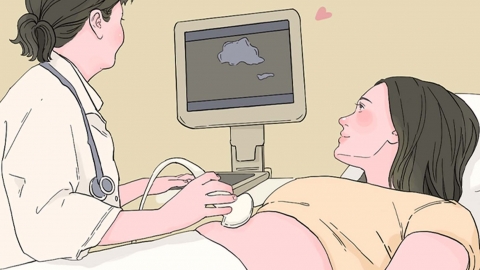What should I do if there is excessive gas in the abdomen during a B-ultrasound examination?
Excessive abdominal gas observed on B-ultrasound may be caused by improper diet, excessive air swallowing, constipation, gastritis, irritable bowel syndrome (IBS), and other conditions. This can be improved through dietary adjustments, improved eating habits, medication, and regulation of intestinal function. If excessive gas continues to interfere with examinations or is accompanied by worsening abdominal pain and bloating, prompt medical attention is necessary.

1. Improper diet: Regular consumption of gas-producing foods such as beans, onions, and carbonated beverages leads to excessive fermentation in the intestines, resulting in large amounts of gas accumulation and possible bloating. It is recommended to reduce intake of gas-producing foods and increase consumption of fiber-rich fruits and vegetables like spinach and apples to promote gas expulsion from the intestines.
2. Excessive air swallowing: Eating too quickly, frequent gum chewing, or eating while facing the wind can lead to swallowing excess air into the abdomen, causing increased gas and possibly belching. It is advised to slow down during meals, chew food thoroughly, avoid talking while eating, and minimize air ingestion.
3. Constipation: Slowed intestinal motility causes prolonged retention of feces in the intestine, where bacteria decompose waste and produce large amounts of gas, leading to increased abdominal gas and difficulty passing stool. Follow medical advice to use medications such as lactulose oral solution, glycerin suppositories (Kaisailu), or Mahuang Runchang Pills to relieve symptoms.
4. Gastritis: Inflammation of the gastric mucosa caused by *Helicobacter pylori* infection or drug irritation impairs gastric motility, slows digestion, and results in gas retention in the abdomen, often accompanied by stomach pain and acid reflux. Patients may take medications such as omeprazole enteric-coated capsules, amoxicillin capsules, and colloidal bismuth pectin capsules under medical guidance to improve symptoms.
5. Irritable bowel syndrome (IBS): Intestinal functional disorders cause abnormal gut motility, impairing digestion and absorption of food, leading to gas accumulation, along with alternating abdominal pain, diarrhea, or constipation. It is recommended to use medications such as pinaverium bromide tablets, quadruple probiotic tablets containing *Bifidobacterium*, and trimebutine maleate tablets under medical supervision to alleviate symptoms.
Daily care should include maintaining regular eating habits and avoiding overeating; taking a light walk after meals to enhance intestinal motility; drinking plenty of water to keep the intestines moist; and developing a routine bowel movement habit to reduce gas buildup.




